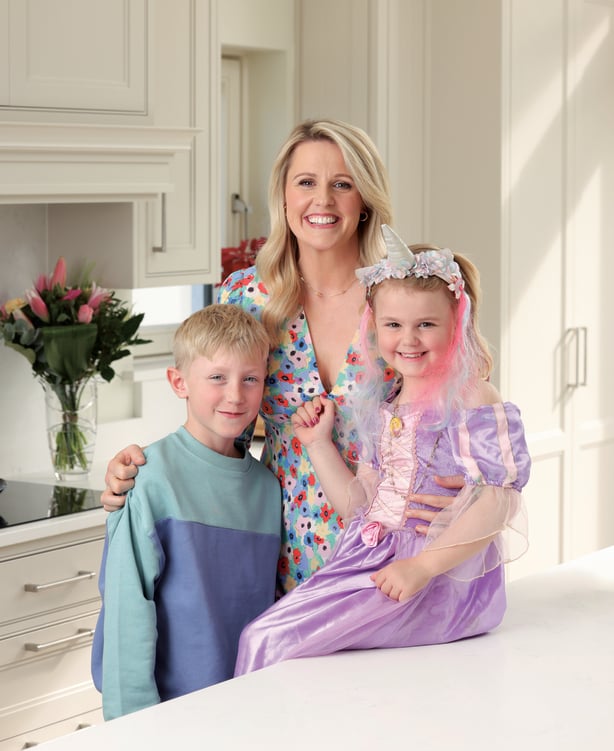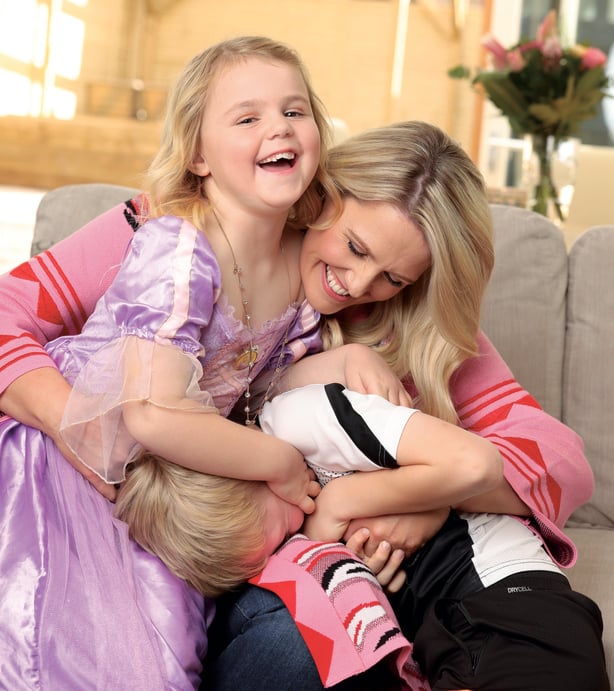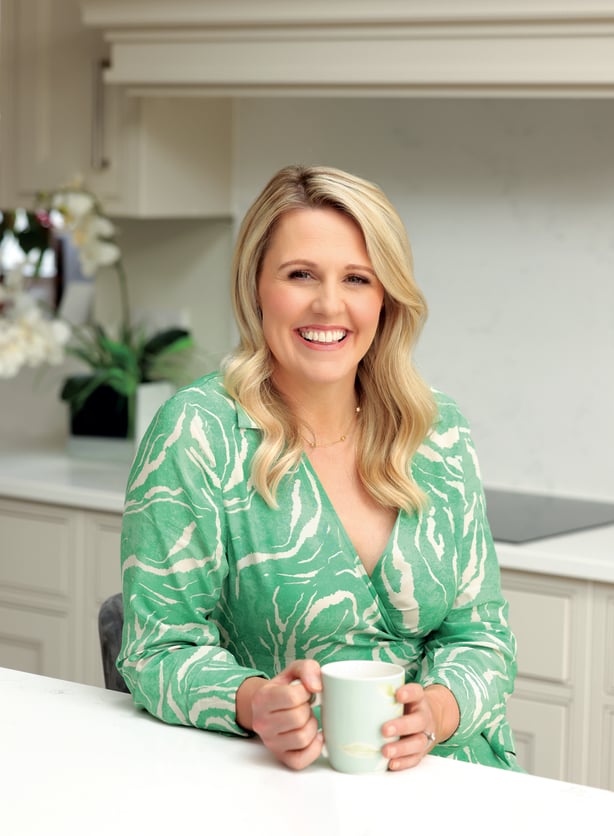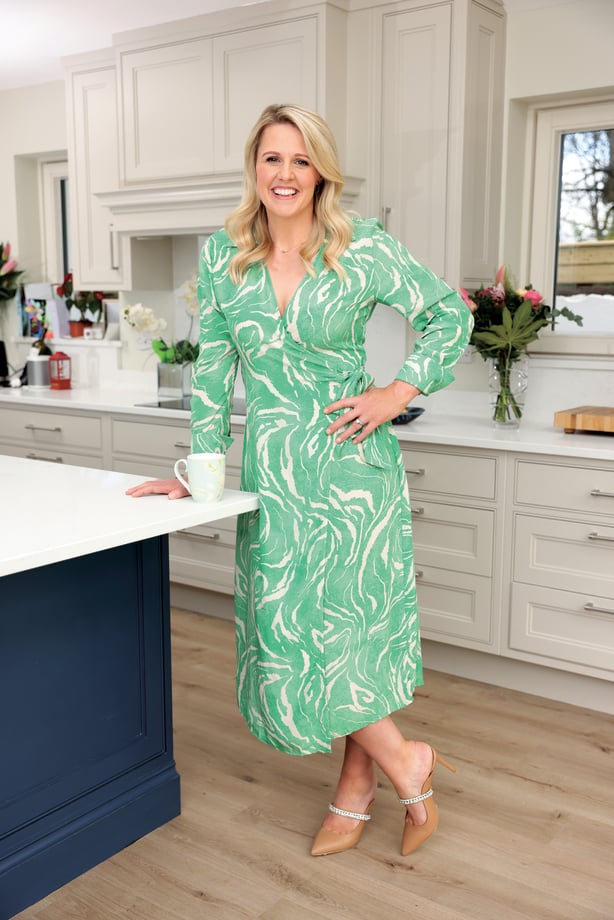Elle Gordon catches up with RTÉ Sports presenter Jacqui Hurley at home to talk about her new job with The Sunday Game, dreaming big and the women who have paved the way in sport.
Jacqui Hurley opens the door of her beautiful Dublin home, where a scene of busy activity awaits. Her youngest daughter, Lily, decked out in a Princess dress and unicorn crown, is doing planks, prompting a 'well done Lily, you're so strong’ from Jacqui.
This warm domestic mood is exactly what I hoped Jacqui Hurley’s home life would look like in the home she shares with her husband Shane, and their two kids Luke (8) and Lily (5). It reminds me that Jacqui has encouraged and inspired many young women and men in sport over the years: no surprise that she is fostering that love and respect for healthy activity at home too.

First things first, though, her big move to take over as presenter of The Sunday Game. Her intention, she said earlier this year, was to slow down a little, but now as she faces into the GAA season, she says she took up this new job on her terms.
"To be honest, the way it happened, it just changed my plans. I had taken over the rugby last year and I had never done that before. I had said ‘Let’s give it the year and let’s have a chat.’ At the end of the year, I was thinking ‘I can’t do all the things.’ I was still doing Sunday Sport, European rugby, Irish rugby and doing the news. I said to my boss, ‘You need to take something off my plate,’ so I had stepped away from Sunday Sport and the radio and thought then I will just be doing rugby from now. The Sunday Game opportunity came out of the blue. I wasn’t expecting it. And then I got the call.
"For context, The Sunday Game, for me, was all I ever wanted for years. So, when they asked me, I was like ‘Wow!’ But I was also thinking, ‘I can’t do that on top of the rugby as well.’ Then my boss said, ‘What if we changed your work schedule so you will do less rugby and then The Sunday Game.’ There was just a lot of moving pieces, and we got it to a place where it worked.

"The Sunday Game has been something that we have all grown up with. I think when I finally got my head around the idea, the emotion was: ‘This is dream come true kind of stuff.’ The truth is that I thought it has passed me by. I really wanted it in 2017 and I didn’t get it. At that point, I was working my whole career, thinking The Sunday Game was where my destiny lay. But then I thought it had passed me by and I was fine with that. I was devastated the first time when I didn’t get it, but at the same time, you move on.
"People tell you there are other things out there for you and then I suppose after a while you start to believe them. Then the rugby came around and it has been such a dream to get to do something like that. So really, I was quite content. I wasn’t chasing The Sunday Game. It came full circle and that is exactly how I feel about it now. I am very much in the mindset of trying to enjoy it as much as I can. I think everyone in Ireland feels like they own The Sunday Game and I think that is why it is so special.
"Everyone around the country knows what it is, and everybody has an opinion about who should be on it, what counties should be featured in terms of matches, who should be presenting it, who should be the pundits. Everyone has an opinion on it, so I guess there is a pressure that comes with that, but also an enjoyment. These are the days that you want to be involved in.
"One of the reasons that you get into sports broadcasting is that you want to do big shows like this. Is it going to be hard? Is it going to challenging? Absolutely, but I know I am going to absolutely love it."

Jacqui has always encouraged women’s visibility in sport and sports broadcasting, so this must feel like a great moment. "Of course, but to be honest, now it is as normal to turn on the television and see a woman sitting there as well as a man and I think RTÉ has been at the fore of that. From Joanne [Cantwell], Claire [Byrne] and Evanne [Ní Chuilinn], there are lots of strong women, and not just in RTÉ.
"For young women in sport coming through; I think the landscape that they are entering is very different to what I would have come into. If you look around, you see loads of women and so I hope that is encouraging for them and will continue.
"For me, I don’t really care what gender a person is, so long as they know what they are talking about. I judge on merit as a pundit, and I don’t see that as a gender issue anymore. I think the strides that we have made in the last five years have been so rapid and have gone so much faster than they had in the previous 50. I think that wave of pundits and female analysts coming through is only going to become more prevalent, but it is because of their quality. That quality is so good."

At work, Jacqui is a role model for her children, but I point out that she also seems to enjoy getting glammed up for her photoshoot. A great example to young women that we can do both.
"You can do both. The other day, we were playing hurling and Lily was in her Princess dress with her helmet on, a unicorn headband and a pink hurley and I was like ‘Hey yeah, she is super girly, and she loves her dresses’ but that doesn’t mean she can’t be strong and sporty as well.' When I go into schools, and I talk to young girls, a big thing for me would be the way we classify sport for girls.
"We have this tendency to say, ‘OK, if they don’t do team sports, they are not sporty. But how many girls out there are doing Irish dancing and gymnastics, yoga and swimming and running? I have loads of pals who would tell me they are not sporty but they are doing park runs every weekend. They are incredibly sporty. It is so important that we start them off knowing that the activity they are doing is sport."
She believes it is essential to set the example for younger generations. "If your daughters see you going out the door to play casual sport, they will know that they can do that too and that is hugely important. Whether it is Gaelic for mothers or a Parkrun or whatever it is, I would be encouraging people to get active because I think it is a message that you are showing your kids and it is crucial.
"For me, I love getting dressed up. I love make-up and hair extensions and all those things, and still want to go out and play camogie or basketball. I have always seen it as just being a well-rounded person and I try to get the balance right. It isn’t always perfect, but I like to think it is pretty good!"


